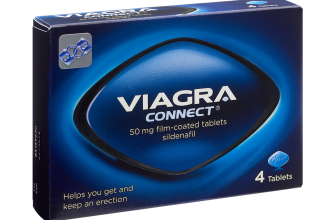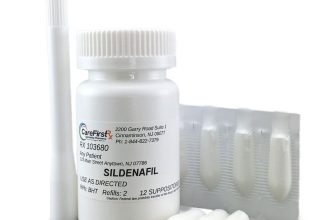Monitor your heart rate carefully after taking Viagra. A slight increase is common, but significant changes warrant immediate medical attention. Consult your doctor if your heart rate exceeds 100 beats per minute or you experience chest pain, dizziness, or shortness of breath.
Viagra, or sildenafil, affects blood vessels, causing vasodilation which can influence heart rate. This effect is generally mild in healthy individuals, but pre-existing cardiovascular conditions may increase the risk of adverse reactions. Understanding your personal risk factors is crucial.
Before taking Viagra, discuss your medical history with your physician, specifically mentioning any heart conditions, high blood pressure, or previous heart attacks. They can assess your suitability and recommend appropriate dosage or alternative treatments. Regular check-ups during treatment are recommended to track your heart health.
Remember: This information is for educational purposes and does not constitute medical advice. Always consult a healthcare professional for personalized guidance regarding Viagra and its potential effects on your heart rate. Your health is paramount.
- Viagra and Heart Rate: A Detailed Look
- Understanding the Mechanism
- Potential Risks and Precautions
- How Viagra Affects Heart Rate: The Mechanism of Action
- Viagra and Heart Rate: Potential Risks and Side Effects
- Understanding the Risks
- Who Should Exercise Caution?
- Managing Potential Side Effects
- Disclaimer: This information is for educational purposes only and does not constitute medical advice. Always consult your physician before starting any new medication.
- Viagra and Heart Rate: Interactions with Other Medications
- Nitrates and Viagra
- Alpha-blockers and Viagra
- Other Medications
- Always Consult Your Doctor
- Viagra and Heart Rate: When to Seek Medical Attention
Viagra and Heart Rate: A Detailed Look
Viagra, or sildenafil, can slightly increase your heart rate. This effect is generally mild and temporary for most men, typically a few beats per minute. However, individuals with pre-existing cardiovascular conditions should exercise caution. Consult your doctor before using Viagra if you have a history of heart disease, high blood pressure, or irregular heartbeat.
Understanding the Mechanism
Viagra works by increasing blood flow throughout the body, including to the heart. This increased blood flow can lead to a slight elevation in heart rate. The magnitude of this effect varies depending on individual factors like dosage, overall health, and the presence of other medications. Regular exercise and a healthy diet can help mitigate any potential cardiovascular impact.
Potential Risks and Precautions
While generally safe for healthy individuals, combining Viagra with nitrates (often used to treat angina) can cause a dangerous drop in blood pressure. This combination should be strictly avoided. Men experiencing chest pain, dizziness, or shortness of breath after taking Viagra should seek immediate medical attention. Regular monitoring of blood pressure and heart rate is advisable, especially in those with underlying health issues. Your doctor can help determine the appropriate dosage and monitor your response to the medication.
How Viagra Affects Heart Rate: The Mechanism of Action
Viagra, or sildenafil, primarily affects heart rate indirectly by impacting the body’s blood vessels. It inhibits an enzyme called phosphodiesterase-5 (PDE5), leading to increased levels of cyclic guanosine monophosphate (cGMP). Increased cGMP relaxes smooth muscles in blood vessels, particularly in the lungs and penis. This vasodilation causes decreased blood pressure.
This reduction in blood pressure can sometimes lead to a slight decrease in heart rate, a compensatory mechanism to maintain adequate blood flow to the vital organs. However, the magnitude of this change varies significantly between individuals. Several factors influence the effect, including the dose of Viagra, overall cardiovascular health, and the presence of other medications.
While generally a minor effect, individuals with pre-existing cardiovascular conditions, such as heart disease, high blood pressure, or angina, should be particularly cautious. Viagra can interact negatively with nitrates, a class of drugs used to treat angina, potentially causing a significant drop in blood pressure.
| Factor | Effect on Heart Rate |
|---|---|
| Viagra Dose | Higher doses may lead to a more pronounced decrease in blood pressure and, consequently, heart rate. |
| Pre-existing Cardiovascular Conditions | Individuals with heart problems are at increased risk of adverse cardiovascular events. |
| Concomitant Medications | Interaction with nitrates can cause dangerously low blood pressure. |
Always consult your doctor before using Viagra, especially if you have any concerns about your heart health or are taking other medications. A thorough medical evaluation can help determine whether Viagra is safe for you and assess potential risks.
Viagra and Heart Rate: Potential Risks and Side Effects
Consult your doctor before using Viagra, especially if you have pre-existing heart conditions. Viagra, or sildenafil, can lower blood pressure, potentially causing a rapid or irregular heartbeat in susceptible individuals. This effect is amplified if you also take nitrates.
Understanding the Risks
Increased heart rate is a common side effect, typically mild and temporary. However, some individuals experience more significant changes. Chest pain, shortness of breath, or dizziness following Viagra use require immediate medical attention. These could indicate serious cardiovascular complications.
Who Should Exercise Caution?
Men with a history of heart attack, stroke, heart failure, or irregular heartbeats should be particularly cautious. Those with high blood pressure or low blood pressure also face increased risk. Using Viagra with certain medications, such as nitrates used to treat angina, is contraindicated due to the potentially dangerous drop in blood pressure. Your physician can assess your risk profile and help you make an informed decision.
Managing Potential Side Effects
If you experience an unusually fast or irregular heartbeat after taking Viagra, stop using the medication and seek medical advice. Your doctor might adjust your dosage or recommend alternative treatments. They can also perform tests to determine if Viagra is safe for you to use.
Disclaimer: This information is for educational purposes only and does not constitute medical advice. Always consult your physician before starting any new medication.
Viagra and Heart Rate: Interactions with Other Medications
Always inform your doctor about all medications you’re taking, including over-the-counter drugs and supplements, before starting Viagra. Certain medications can significantly impact your heart rate and increase the risk of adverse reactions when combined with Viagra.
Nitrates and Viagra
Combining Viagra with nitrates, often prescribed for chest pain (angina), can cause a dangerous drop in blood pressure, potentially leading to fainting or even a heart attack. This interaction is extremely serious and should be strictly avoided.
Alpha-blockers and Viagra
Alpha-blockers, used to treat high blood pressure and enlarged prostate, can also lower blood pressure. Taking Viagra with alpha-blockers may cause a significant drop in blood pressure, especially when starting either medication. Your doctor might adjust your dosage or recommend an alternative treatment.
Other Medications
Several other medications can interact with Viagra, potentially affecting your heart rate. These include some antidepressants, antifungals, and HIV medications. Open communication with your healthcare provider is key to ensure medication safety. They can help assess potential risks and adjust your treatment plan accordingly to minimize adverse effects.
Always Consult Your Doctor
This information is for educational purposes only and does not substitute for professional medical advice. Always discuss potential medication interactions with your physician before starting or changing any medications. Your doctor can provide personalized guidance based on your specific health conditions and medications.
Viagra and Heart Rate: When to Seek Medical Attention
Experience chest pain, tightness, or discomfort? Contact your doctor immediately. This could indicate a serious heart problem.
Feel your heart racing or beating irregularly (palpitations)? Don’t delay; seek medical help. These symptoms warrant immediate attention.
Suffering from dizziness or lightheadedness after taking Viagra? This is a potential sign of low blood pressure and requires medical evaluation.
- Severe Headache: A sudden, intense headache following Viagra use needs prompt medical attention. It could indicate a serious issue.
- Shortness of Breath: Difficulty breathing after taking Viagra may signal heart or lung problems. Contact a healthcare professional immediately.
- Nausea or Vomiting: While some mild nausea is possible, persistent or severe nausea/vomiting necessitates immediate medical assistance.
Remember, these are potential side effects. Your individual response to Viagra might vary. Consult your physician before taking Viagra, especially if you have pre-existing heart conditions.
- Discuss your medical history: Be fully transparent about any heart problems, high blood pressure, or other relevant health issues.
- Follow your doctor’s advice: Adhere to the prescribed dosage and instructions precisely.
- Report any unusual symptoms: Maintain open communication with your doctor and report all symptoms, no matter how minor they may seem.
Taking Viagra responsibly is crucial for your safety. Early intervention for serious symptoms can prevent complications.









